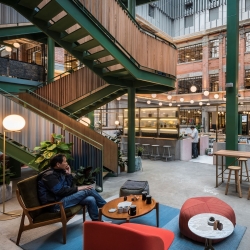To provide the best experiences, we use technologies like cookies to store and/or access device information. Consenting to these technologies will allow us to process data such as browsing behaviour or unique IDs on this site. Not consenting or withdrawing consent, may adversely affect certain features and functions.
The technical storage or access is strictly necessary for the legitimate purpose of enabling the use of a specific service explicitly requested by the subscriber or user, or for the sole purpose of carrying out the transmission of a communication over an electronic communications network.
The technical storage or access is necessary for the legitimate purpose of storing preferences that are not requested by the subscriber or user.
The technical storage or access that is used exclusively for statistical purposes.
The technical storage or access that is used exclusively for anonymous statistical purposes. Without a subpoena, voluntary compliance on the part of your Internet Service Provider, or additional records from a third party, information stored or retrieved for this purpose alone cannot usually be used to identify you.
The technical storage or access is required to create user profiles to send advertising, or to track the user on a website or across several websites for similar marketing purposes.
 Life Based Value has announced the launch of ‘Crisis’, a brand new digital training program available for British businesses that harness unique skills learned during the current lockdown for the world of work. The announcement took place at EdTechX’s Global online summit, from company founder Riccarda Zezza, as the UK is facing one of its most intense and challenging ever transitions – the disruption of normal working life due Covid-19, and the eventual return to work after lockdown measures eventually ease. (more…)
Life Based Value has announced the launch of ‘Crisis’, a brand new digital training program available for British businesses that harness unique skills learned during the current lockdown for the world of work. The announcement took place at EdTechX’s Global online summit, from company founder Riccarda Zezza, as the UK is facing one of its most intense and challenging ever transitions – the disruption of normal working life due Covid-19, and the eventual return to work after lockdown measures eventually ease. (more…)




















 An emerging super-group of employees and consumers in the UK is adding intense pressure to already challenged C-suite leaders who are navigating tough economic, technological and geo-political environments – further threatening company growth, a new Accenture (NYSE: ACN) study finds. With nearly three-quarters (73 percent) of these powerful stakeholders believing they have the potential to destroy company value in the long term, the C-suite understands the need to respond.
An emerging super-group of employees and consumers in the UK is adding intense pressure to already challenged C-suite leaders who are navigating tough economic, technological and geo-political environments – further threatening company growth, a new Accenture (NYSE: ACN) study finds. With nearly three-quarters (73 percent) of these powerful stakeholders believing they have the potential to destroy company value in the long term, the C-suite understands the need to respond. 











April 29, 2020
We should be addressing the why of the return to work as much as the how
by Judy Gavan • Comment
As we anticipate a return to relative normality post lockdown (whenever that may be), workplace strategy is a hot topic. In considering how we respond to new challenges let’s make sure we keep sight of the big picture. We need to address immediate issues whilst exploiting new opportunities to reinforce and expedite our established strategic direction. Choice and flexibility are central to the wider business reform agenda and should remain our touchstones. (more…)